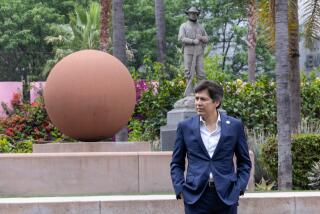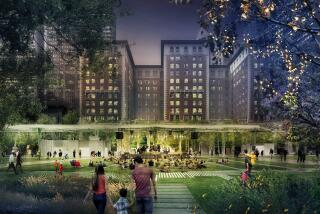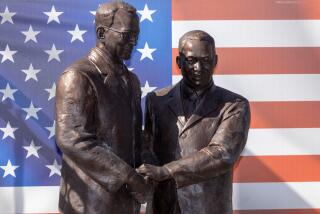Rosa Parks Dedicates Mobile Health Center
- Share via
PACOIMA — The mother of the modern civil rights movement in the United States walked slowly in a side door of the Northeast Valley Multipurpose Senior Center on Thursday.
Despite the gray drizzle and chill outside, there were just too many people gathered for 82-year-old Rosa Parks to get in the front door.
Parks, hailed worldwide as a hero for her refusal in 1955 to give her seat to a white man on an Alabama bus--sparking a 381-day bus boycott that eventually led to desegregation--was invited to Pacoima for the dedication of a new mobile health center for senior citizens.
The center was developed in a partnership between the city of Los Angeles Department of Aging and the Charles R. Drew University of Medicine and Science in Los Angeles. Named after Parks, the 40-foot mobile clinic will provide basic medical services to 15 senior centers around the city.
Parks, who will turn 83 in February, has a pacemaker for her heart and tires easily. She spoke far less than the health officials and politicians who were present.
When it was her turn, she carefully put down her black bag, adjusted her purple hat, bent the microphone and cleared her throat. When she did, most of the nearly 300 people seated in the center’s spacious lobby rose and applauded. She hadn’t yet said a word.
“Thank you,” she said. “I feel very much at home. It’s not my first visit here,” she added, noting that she had been to Pacoima, one of the first black communities in the San Fernando Valley, more than 10 years ago to visit relatives of her husband.
She corrected a misinterpretation about what exactly she did on the bus that December day in Montgomery, Ala.
“I was not sitting in the front of the bus,” Parks said, noting that many people think she was asked to move to a seat in the back.
“It was a matter of standing, or sitting. The driver did not want to see a white man stand” while a black woman sat, Parks said.
Then, she addressed the reason she had come.
“I’m glad we’re working together,” she said. “As we get older, we need more medical and personal care. As we go from place to place, we’re concerned about all people in need.”
Parks later refused to respond to a reporter’s question about the status of race relations in Los Angeles in the wake of the O.J. Simpson murder trial.
“I don’t want to discuss Simpson,” she said. “I came here because I was invited . . . I do my best to be as positive as I can.”
Ann Smith, general manager of the city’s Department of Aging, said getting Parks’ permission to name the new mobile medical center after her was seen as a way to increase the visibility and credibility of the new program.
The mobile clinic was developed in response to the growing need of seniors for access to basic medical services, Smith said.
Six senior citizen centers outside the Valley have medical equipment on-site to provide basic health screening and dental, ear-nose-throat and eye-care services. But other centers, including five in the Valley, lack such on-site facilities and will be visited monthly by the mobile clinic, Smith said.
While waiting for Parks to speak, Bea Joseph, a peer counselor at the senior center, said it was an occasion she wouldn’t miss for the world.
“You know, there wouldn’t have been any Martin Luther King Jr. if there hadn’t been a Rosa Parks,” Joseph said. “I never dreamed I’d get to see her in person.”
So does Parks still ride the bus?
“If necessary,” Parks said with a smile. “Yes, if necessary.”
More to Read
Sign up for Essential California
The most important California stories and recommendations in your inbox every morning.
You may occasionally receive promotional content from the Los Angeles Times.













